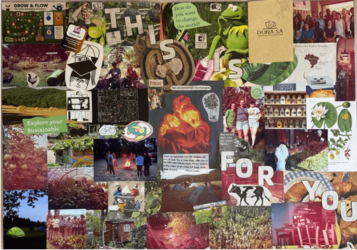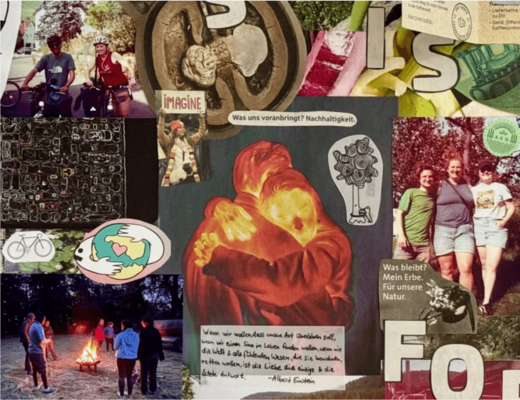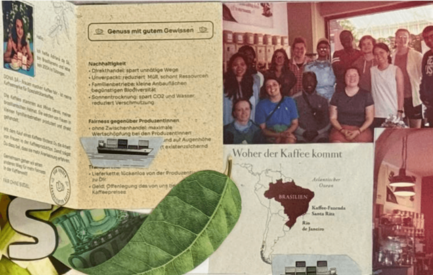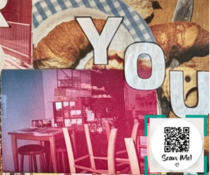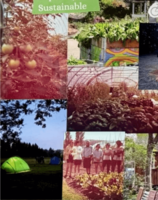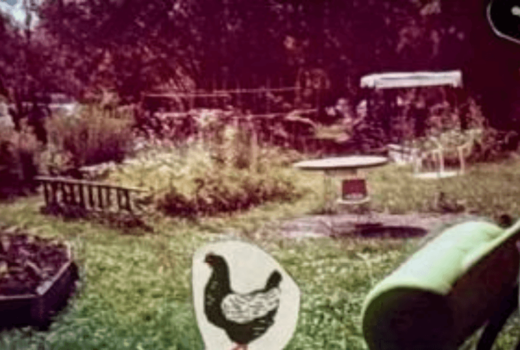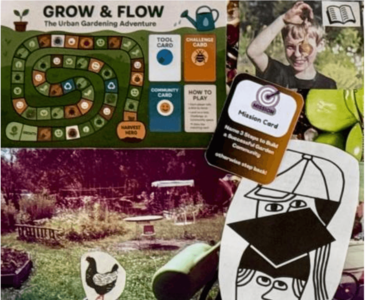Context of the Collage
Dear reader, we invite you to explore deeper insights of our communication product of a five-day biking excursion through Utopias in the Summer Semester 2025. We are Iman Karami and Saskia Regorius, currently students in the master programs “Environmental Science - Soil, Water and Biodiversity” and “Transformation Management for sustainable Agri-Food systems” at the University of Hohenheim. The collage and the game resulted from the module “Exploring Regional Transformation through Utopias” which falls under the Department “Sustainable Use of Natural Resources (430C)”(Hohenheim, n.d.-a) at the University of Hohenheim. The module is part of the TREE Transformation (Experience and Learn) project, funded by the Foundation for Innovation in Higher Education (Hohenheim, n.d.-b) and taught by the three very inspiring personalities Prof. Dr. Verena Seufert, Amelie Schönhaar and Anna Struth.
Introduction
The collage is constituted by image and text snippets, connecting the complex topics and relations of transformation, we experienced while visiting Utopias. We want to present diverse fields of lived sustainability and suggest action opportunities by visually illustrating the visits to utopian initiatives during our five-day excursion. Additionally, Iman provides his educational game “Grow & Flow: The Urban Garden Journey” as a downloadable pdf- format, so you can face the garden challenge at home. The game gives educational depths, providing a playful and interactive setting, while the collage creates a more emotional accessibility to the topic.
The heart of our collage
The heart of our collage pictures two peoplehugging each other. It is referring to an articleabout Hannah Ritchie which is an environmentalscientist and book author, who tries to createhope through reporting positive environmentalachievements (Thadden, 2024). With thesuggestion of initiatives on our collage, wherepeople can learn and become active towardssustainability and climate justice, we want toadopt this "supportive" climate communicationstrategy (Stoknes, 2014) as well. Underneath thetwo hugging persons, the poem of Albert Einsteinexpresses the importance of love, for theprotection of environment and living beings on earth(josia-nakash, 2020). Below the two hugging persons, the shown seed "Coco-de-Mer" is with 15kgthe biggest seed in the plant world. It symbolizes a "Seed of a good Anthropocene" (Bennett et al.,2016), as our visited initiatives can be seen as seeds, "scaling up, out and deep"(Bennett et al., 2016).On the right side you can see Anna Struth and Amelie Schönhaar as our teachers and change agents aswell as Conrad who accompanied our bicycle tour. He is part of the student group AKN, which Annahelped found. Networks and Change Agents are important, as they hold participatory opportunitiesand the change to connect individuals, creating hope and strength in numbers. In the left part is aparking spot with painted, fading cars. We want to imagine car-free cities as a way to create a moresuitable living environment for us humans. Furthermore, we want to highlight our biking excursion asan experience based educational approach towards environmental and sustainability topics (Horton,2006). ''The active body learns in ways that are eminently more personal, applicable, critical and long-lasting than any other teaching method'' (Pineau, 1994).
Dona Sà (Cafélädle von DONA SÁ in Tübingen, n.d.)
Dona Sà is a Café we visited in Tübingen, ownedby Ariana de Sa. It is worshipping women´s workand acts as a platform for more visibility of stillexisting inequalities for female farmers in Brazil,which is her home country. Furthermore, it fostersthe visibility of the problematic of farmersexploitation in coffee production all over theworld. It is about supporting women andsustainability as an act of compassion and thestruggle to address existing situations caused bythe colonization of Brazil. Women are enabled tohave a secured and fair income (50% more moneythan fair trade), directly transferred to their own bank accounts. Direct sales are excluding othermiddlemen and therefore leave more value creation for the producer. Adriana states that "It should bea human right, that farmers are able to decide prices for their own coffee, their own product". This is agreat opportunity to reflect on the origin and production of your daily consumer goods and asuggestion for making a positive adjustment to these patterns.
Food- sharing Café Mehrrettich (Mehrrettich – Das Foodsharing Café in Tübingen, n.d.)
This is a food- sharing Café in Tübingen is registered as an non-profitorganization offering free, rescued food to the customers. With itssolidary prices on beverages and the use of regional, ecological and fairproducts, it creates a social and just space for every member of thesociety. Furthermore, it is a public space for encounters related toeducational, cultural, communal and political events.
Alte Sprudelfabrik Eyach – housing project (WOHNPROJEKT ALTE Sprudelfabrik EYACH, n.d.)
This housing project located near Tübingen, wasfounded in 2013. Meanwhile 25 people betweentwo and seventyseven years can call it a home,practicing sociocracy (Sociocracy - Basic Conceptsand Principles - Sociocracy For All, 2020) for alltheir decisions. Through this way of living, the members seem in touch with nature, themselves andtheir community. As a part of the "Mietshäuser Syndikat", every member owns equal part of the landit is secured from privatization or speculation.
Gärtnerei Guter Grund (VSP | Gärtnerei Tübingen, n.d.)
The Gärtnerei Guter Grund belongs to the "Association for SocialPsychiatry Tübingen",which distributes their products through a CSA(Community Supported Agriculture). This "commons- project" activelyincludes members of the society which struggle with mental health oraddiction problems. The great thing is, that the CSA spreads a lot ofawareness for these issues in the general population. At the same time,clients are given the opportunity to experience nature and smallachievements through gardening. This space is used to feed the CSAmembers and to encourage and rehabilitate people. Commons (Vivero-Pol, 2017) are not only about shared land owning rights, but about thepeople who use it and create a community that cares for each other inmany dimensions.
“Wörth Garden Nürtingen“ - a Community Garden (Bunte Beete Nürtingen (@buntebeetenuertingen) • Instagram-Fotos und -Videos, n.d.)
The role of community in sustainability particularly in the context ofurban gardening is both foundational and transformative. Whileindividual actions like composting or planting a few herbs can makemeaningful contributions, it is the collective efforts of communitiesthat create resilient, long-lasting change. Urban gardens that aredesigned and maintained by community members offer more than just food-they cultivate sharedownership, local knowledge, and social cohesion (Firth et al., 2011).
In many of the projects we visited during the excursion, community was the driving force behindsuccess. For example, the Wörth Garden in Nürtingen, which thrives not simply because of good soil orsmart design, but because neighbors collaborate to maintain it. They share seeds, tools, labor, andstories. When someone cannot attend to their plot, others step in. This mutual care is a form of socialinfrastructure-one that sustains the garden as much as sunlight or water.
Urban Gardening & the Game “ Grow & Flow: The Urban Garden Journey”
Urban gardening is more than just a way to grow food in smallcity spaces. It is a creative and accessible method forreconnecting people with the land, their neighbours, andsustainable living practices. Whether it takes place on balconies,rooftops, or in shared community plots- urban gardeningpromotes self-sufficiency, environmental awareness, and socialcooperation. To explore and communicate this transformativepotential in an engaging way, Iman developed a board gamesimulating the journey of starting a garden. Players face real-world challenges, discover tools, and engage in community actions, making complex sustainabilitytopics fun and accessible (Tan & Nurul-Asna, 2023a).
Educational Value: Urban gardening translates abstract sustainability concepts into hands-on learning.The game replaces lectures with interactive scenarios, teaching systems thinking and problem solving.Cards present tools, challenges, and community dynamics, encouraging reflection and cooperation. It'sdesigned not to compete, but to grow together, much like real community gardens (Tan & Nurul-Asna,2023b).
Our Goal
We hope to achieve a personal reflection towards your own acting possibilities and responsibilitiesregarding our shared environment. We hope to inspire you for the inner journey, we experiencedduring the excursion and the insight, that we can achieve something great, if working together. Finallywith the game, we want you to feel empowered to act in your own spaces and communities. "Grow &Flow" is not just a game - it's an invitation to imagine and build new futures, one seed at a time.

